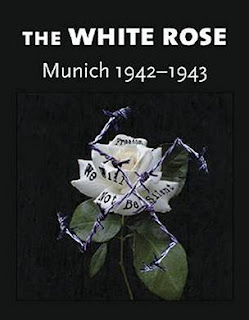More tiresome histrionics from LavaGirl and the money masters today.
When their positions finally implode, perhaps they will make pretty sparks in the night sky for the children. And then they will be gone, their gifts and talents not only wasted, but their names blackened shamefully, and forgotten as if written in ashes.
Silver is carving out a massive triangle pattern on the weekly chart.
Gold is a little more guarded here, but the next week or so should give it a clearer voice.
Below I remember those who are worth remembering, and forget those who have been weighed, and are found wanting.
On 22 February 1943, Scholl, her brother Hans and their friend Christoph Probst were found guilty of treason and condemned to death. They were all beheaded by executioner Johann Reichhart in Munich's Stadelheim Prison only a few hours later, at 17:00 hrs. The execution was supervised by Walter Roemer, the enforcement chief of the Munich district court. Prison officials, in later describing the scene, emphasized the courage with which she walked to her execution. Her last words were:
"How can we expect righteousness to prevail when there is hardly anyone willing to offer themselves up individually for a righteous cause?
Such a fine, sunny day, and I have to go."
The White Rose
Fourth Leaflet
Munich, 1942
We will not be silent.
"...It is the time of the harvest, and the reaper cuts into the ripe grain with wide strokes. Mourning takes up her abode in the country cottages, and there is no one to dry the tears of the mothers. Yet Hitler feeds those people whose most precious belongings he has stolen and whom he has driven to a meaningless death with lies.
Every word that comes from Hitler's mouth is a lie. When he says peace, he means war, and when he blasphemously uses the name of the Almighty, he means the power of evil, the fallen angel, Satan. His mouth is the foul maw of Hell, and his power is at bottom accursed. True, we must conduct a struggle against the Nazi terrorist state with rational means; but whoever today still doubts the reality, the existence of demonic powers, has failed by a wide margin to understand the metaphysical background of this war.
Behind the concrete, the visible events, behind all objective, logical considerations, we find the irrational element: The struggle against the demon, against the servants of the Antichrist.
Everywhere and always demonic powers lurk in the dark, waiting for the moment when man is weak; when of his own volition he leaves his place in Creation, as founded for him by God in freedom; when he yields to the force of evil, he separates himself from the powers of a higher order; and after voluntarily taking the first step, he is driven on to the next and the next at a furiously accelerating rate.
Everywhere, and at times of greatest trials, men have appeared, prophets and saints who cherished their freedom, who preached the One God and who with His help brought the people to a reversal of their downward course. Man is free, to be sure, but without the true God he is defenseless against the principle of evil. He is a like rudderless ship, at the mercy of the storm, an infant without his mother, a cloud dissolving into thin air..."
Please distribute this as widely as possible.
"God has a way of standing before the nations with judgment. And it seems that I can hear God saying to America, 'You're too arrogant! And if you don't change your ways, I will rise up and break the backbone of your power, and I will place it in the hands of a nation that doesn't even know my name. Be still, and know, that I'm God.'"
Martin Luther King, It's A Dark Day In Our Nation, 30 April 1967

































